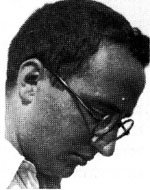Son of Alfonsa and Yitzhak Shmuel. He was born on April 17, 1905 in Rome, Italy to a privileged Italian Jewish family. After completing high school, he completed his studies in the social sciences and philosophy. Already in his youth, he stood out for his great energy, social activism and organizational ability, and was aware of his sensitivity to equality and justice. At the age of sixteen he was attracted to the Zionist movement and two years later, in 1923, he traveled to Karlsbad to attend the 13th Zionist Congress held there. This congress gave him a deep experience. In 1927 he immigrated to Eretz Israel where he first went to work in the orchards of Rechovot. In 1928 he joined the founders of Kibbutz Givat Brenner and from then until his last day was a member of the kibbutz. On Enzo, a member of the settlement, one of his friends wrote: “This project was the essence of his spirit and his life, and he built this settlement, because there is no corner in our lives, in our economic life as our cultural life, where there is no trace of the abundance of influence that this personality has delegated …” At the end of 1929 he was released from his position in the agriculture to travel to Italy and raise money to buy the first thousand dunams of kibbutz land. At the same time, he was aware of the importance of the ingathering of the exiles to the Land of Israel and after fulfilling his mission for the kibbutz, he devoted himself to activity among Diaspora Jewry, to train and encourage immigration. In 1931 he set out on a mission to Germany, and a year later, immediately after Hitler’s rise to power, he went there again on behalf of HaKibbutz Hameuhad and worked in Hechalutz and the pioneering youth movements. He was one of the organizers of the immigration of German Jews to Palestine. He did much to transfer Jewish property to Palestine in order to help fortify the agriculture of the Yishuv. A few years later he was sent on behalf of his movement and the national foundations to America. In 1940, a few weeks after he returned to Israel from a mission in Europe, he volunteered to serve in the British army fighting the Nazis. Immediately after his enlistment, he was sent to work in the British Intelligence Service in Egypt. He engaged in anti-Fascist propaganda, founded and edited an Italian newspaper distributed among 200,000 Italian citizens and prisoners of war in Egypt. He also ran a broadcasting station for propaganda in the Italian language. Towards the end of 1943, a worker began to implement a daring plan to bring emissaries from Palestine on European soil to reach Diaspora Jewry. In February 1944, he himself volunteered to jump. In March 1944, he went to Bari, in southern Italy, where he took a parachuting course and aided the Jewish refugees who were concentrated there and threatened with extinction after the German takeover of Italy. In mid-May 1944 he went on a plane to parachute into the German-occupied territory of northern Italy. According to the plan, it was supposed to land in the Ferrara region, but the pilots were mistaken, and he fell in a fortified area of the German army and was captured. He was transferred to a POW camp in Germany and from there he was returned to Verona, Italy, and spent a month in a cellar in the SS. In October he was transferred to the Dachau extermination camp where he was executed on 2 Kislev, November 18, 1944. His burial place was unknown, and he left behind behind a wife, two daughters, a mother, a sister and a brother. “I do not know a messenger who came into contact with so many exiles. He worked and influenced the Jews of Germany, France, the Netherlands, America, Egypt and Iraq, and for each nationality he found the dialect and expressed it and acted as though he had come out of it. The Jews in that country saw him as one of their own, without a barrier and partition. But the most important virtue, his biggest character trait was a tremendous love for the universe, for nature, for man, for the Jew. He spent a lot of time traveling in his job and spent some time at home.” In his name and memory, Kibbutz Netzer Sirni is named after him, the cultural center of Givat Brenner, streets around the country, etc. His name was also immortalized in “The History of the Haganah”; “Sacred Shield”, “Holy Spring” and “The Messenger.”
